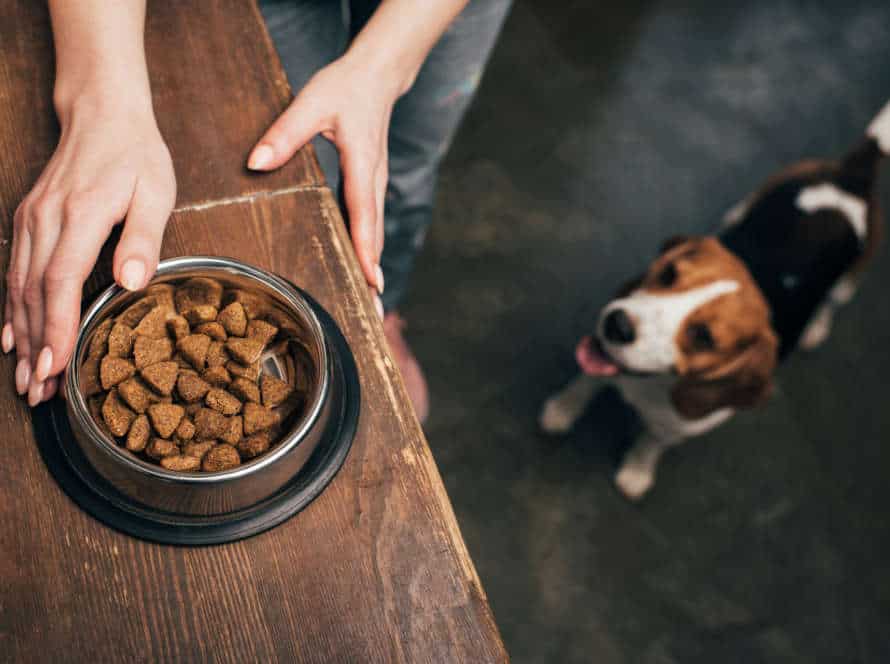Feeding Your Puppy: A Guide to Proper Nutrition
Nutrition is essential for your puppy’s growth and development. Choose the correct food and set up a feeding routine. You should:
- Take a high-quality food for puppies that meets their nutritional needs.
- Give your puppy 3 to 4 small meals daily, not 1 or 2 large ones.
- Offer various fruits and veggies as treats or supplements to their diet.
- Don’t give them human food, especially anything dangerous to dogs, like chocolate and onions.
- Check their weight and change their food intake to prevent overfeeding and obesity.
- Always make sure they have a lot of fresh water.
Pro tip: Speak to your vet if you’re uncertain about your pup’s nutritional needs or worried about their diet.
Nutritional Requirements of Puppies
Puppy nutrition depends on breed, size, age and activity. Puppies need more of certain nutrients than adult dogs. When feeding, consider energy needs and protein/carb/fat ratios. Let’s look at general puppy nutrition requirements.
Puppy growth stages and their nutritional needs
Puppy growth is essential for proper nutrition. Knowing what your pup needs at each stage is key for healthy growth. Here’s the breakdown:
- Neonatal (birth to two weeks): Mother’s milk is all they need. It has all the goodness they need.
- Transitional (2-4 weeks): Soft puppy food, soaked in water, is the way to go.
- Socialization (3-12 weeks): High-quality puppy food is essential for their body’s growth.
- Juvenile (3-6 months): Get a balanced diet for bone and muscle development.
- Adolescent (6 months to 2 years): Maintain a healthy weight by monitoring their calorie intake.
Pro tip: Ask your vet for the best diet for your pup’s breed and size.
Macronutrients and their importance in puppy nutrition
Macronutrients are key for pup nutrition. They give energy and the blocks needed for growth and development.
There are three main macronutrients and their importance:
- Protein: It builds and repairs tissue, makes hormones, enzymes, and supports the immune system. High-quality animal protein sources, like chicken, fish, and beef, are vital for muscle and bone growth.
- Carbohydrates: These give energy and keep blood sugar steady. Whole grains, like brown rice and oats, and vegetables are great carb sources. Simple carbs, like sugar and corn syrup, should be avoided.
- Fats: These give energy, help absorb vitamins, and keep skin and coat healthy. Omega-3 and Omega-6 fatty acids are found in fish, eggs, and nuts.
A balanced diet of protein, carbohydrates, and fats is key for your pup’s health and development. Talk to your vet to decide the best diet for your pup’s nutritional needs.
Micronutrients and their importance in puppy nutrition
Micronutrients are musts for proper puppy growth. These tiny yet mighty nutrients are key to a range of puppy body functions. Here are some essential micronutrients and their importance in puppy nutrition:
- Iron: It helps form hemoglobin, which carries oxygen in the pup’s body.
- Zinc: It bolsters the immune system, encourages cell growth and repair, and helps keep skin and coat healthy.
- Calcium: Essential for bone and teeth development in puppies.
- Vitamin D: Needed to absorb calcium and phosphorus. Also helps regulate the immune system.
- Vitamin E: An antioxidant that protects cells from harm and strengthens the immune system.
It is important to give your pup a balanced diet with the right amounts of these micronutrients, for optimal health and growth.
Determining the Right Puppy Food
Raising a pup? Don’t forget their diet! Selecting the correct puppy food is essential for a healthy, joyful life. To decide the perfect food, you need to comprehend their nutritional requirements and the types of puppy food available. Let’s review the fundamentals.
Decoding dog food ingredients
Reading dog food labels can be tricky. But, it’s very important to make sure your pup is getting the right nutrition. Here are some key ingredients to look for:
- Protein sources like chicken, beef, or lamb for healthy growth.
- Whole grains like brown rice, oats, or barley for digestion.
- Fruits and veggies like sweet potatoes, peas, or carrots for vitamins and minerals.
Beware of artificial preservatives, colors, or flavors. Read label carefully and ask your vet for help.
Fun Fact: Puppies need twice the nutrients of adult dogs and need a special puppy formula.
Choosing the right type of dog food for your puppy
Choosing the right food for your pup is vital for their health, growth and development. Here’s a guide to help you figure out the correct food for your fur baby:
- Consult with your vet to decide the best type of food for your pup’s age, breed, and activity level.
- Look for high-quality puppy food that has the ideal balance of protein, fat, and carbs, with real meat as the main ingredient.
- Pick food that suits your pup’s size, such as small breed, medium breed, or large breed.
- Think about grain-free or limited ingredient options if your pup has food sensitivities or allergies.
- Avoid food with fillers, by-products, or artificial preservatives, which can be bad for their health.
- Adhere to the feeding instructions on the food packaging.
- Monitor your pup’s weight and energy levels to make sure they are getting the right amount of food. Pro tip: Offer fresh water for your pup and watch them during meal times.
Tips for switching your puppy to a new food
Switching your pup’s food can be tricky, but with the right methods, it will be simple and stress-free! Here are some tips:
- Gradual shift: Over 7-10 days, mix the old and new food, upping the amount of new food each day.
- Follow the feed guide: Begin by following the guide on the new food, based on your pup’s age and weight.
- Monitor behavior: Watch out for any changes in appetite, stool, energy levels and overall health during the transition.
- Just one brand: Don’t switch between different brands of food often, as this can cause digestive issues.
- Talk to your vet: Ask your vet if you have any worries about your pup’s health or nutrition.
By following these tips, you can make the switch to your pup’s new food without any difficulties, making sure they get all the nutrition they need to stay healthy.
Feeding Your Puppy
Feeding your pup? A must! Keeping your pet healthy and happy is a priority. Nutrition is vital for proper puppy growth. Provide the right food, the right amount, and at the right time. This guide will cover the basics of feeding your pup. Plus, extra tips on how to make sure your pup gets all the nourishment needed.
How often to feed your puppy
It’s crucial to have a set meal plan for your puppy. This depends on their age, breed, and individual needs. Generally:
- 6-12 weeks: 4 meals/day
- 12-24 weeks: 3 meals/day
- after 24 weeks: 2 meals/day
Monitor their weight and adjust portions. Pick high-quality food that meets their nutritional needs. Don’t give table scraps or human food – this can cause digestive problems & obesity.
How much to feed your puppy
Giving your pup the perfect amount of grub is essential for their health and happiness. What to feed your pup depends on a few things like breed, size, age, and activity level.
Here’s some general tips:
- Pups aged 8-12 weeks need 4 meals a day. Those aged 3-6 months need 3 meals, and pups aged 6-12 months need 2 meals daily.
- Use a measuring cup to portion out their food based on weight and activity level.
- Keep an eye on their body condition and adjust the food as needed. Obesity can lead to health issues in dogs.
- Avoid overfeeding with treats or human food.
- Give your pup fresh, clean water all the time.
What to do if your puppy is overweight or underweight
If your pup is either too heavy or too light, making sure they get the right nutrition is important to help them reach a good weight. Here are some things you can do:
For overweight puppies:
- Give less food.
- Cut down on treats and replace with healthier choices like carrots or beans.
- Do more active stuff like playtime or longer walks.
For underweight puppies:
- Increase meal size.
- Add healthy supplements like boiled eggs, yogurt, or canned pumpkin.
- Do less activity and give your puppy more rest so they have energy to grow.
Pro Tip: It’s essential to keep an eye on your pup’s weight to make sure they’re growing well.
Supplements for Puppies
Supplement up your puppy’s eating regimen! This provides the necessary nutrients to help them grow and develop. The appropriate supplement for your pup depends on their individual needs. Examples of supplements for puppies include multivitamins, omega-3 fatty acids and probiotics.
Deeper details about the advantages of each supplement are in the following part.
Common supplements for puppies
Balance & nutritious diet? Essential for puppies! But, extra support? Supplements! What are they? Here’s the scoop:
- Probiotics: Help promote a healthy digestive system and boost immune system. Especially for puppies with sensitive stomachs.
- Omega-3 Fatty Acids: Necessary for healthy skin, coat, and brain development. Helpful for puppies with dry, itchy skin or allergies.
- Multivitamins: Ensure puppies are getting necessary vitamins & minerals for growth & development.
- Joint Supplements: Glucosamine & chondroitin. For pups prone to joint problems or hip dysplasia.
Pro Tip: Check with the vet first! Supplements to complement, not replace, a balanced diet.
Benefits and risks of puppy supplements
Puppy supplements can have both advantages and disadvantages, depending on the type and pup’s needs.
Advantages: They can give extra nutrition to picky eaters or pups with digestion issues.
Disadvantages: Too much or wrong type of supplement can have bad effects. So, talk to your vet first!
Tip: Read the label and follow dosage guidelines before giving any supplement to your pup.
Consulting with a veterinarian before giving supplements to your puppy
Supplements can be a useful supplement to a puppy’s diet. But, it’s important to consult a vet before giving any to your pup. This way, you can make sure they are safe and effective.
Your vet might suggest supplements that are right for your pup’s unique needs and health status.
Talk to your vet before giving supplements in the following cases:
- If your puppy has an existing health condition or takes medication that could interact with the supplement.
- If your puppy is already getting all their nutrition from their food.
- If you’re not sure about the correct dosage or how often to give the supplement.
A vet can help you use the supplements correctly, and make sure your pup stays healthy and happy.
Homemade and Raw Diets for Puppies
Raw and homemade diets are trending with pet owners. These diets are believed to be much more nutritious than regular diets. Homemade and raw diets mean making food for your pup with particular ingredients or feeding them with raw, natural food.
Let’s look at both the good and bad of homemade and raw diets for puppies. Also, let’s explore how to build the best diet plan for your pup.
Pros and cons of homemade and raw diets
Feeding your puppy a homemade or raw diet has its advantages and disadvantages.
Pros of homemade diets:
- You can choose what goes in your pup’s food.
- Health benefits like better skin and coat, stronger immune system and less digestion issues.
- Cost-effective in the long run.
Cons of homemade diets:
- Time-consuming.
- Hard to get the right nutrition balance.
- Risk of bacterial infection from raw food.
Both raw and homemade diets have benefits, but you must consider the pros and cons before deciding. It’s important to maintain a healthy balance of nutrition for optimal health.
Controversies surrounding homemade and raw diets for puppies
Feeding your pup a homemade or raw diet has been a debated topic among pet owners and vets.
Supporters say it gives benefits like glossier coats, better digestion and stronger immune systems. Critics, however, argue that it could have health issues such as nutritional deficiencies, bacterial infections and parasites from raw meat and bones.
Before making any changes to your pup’s diet, consult with a vet or a board-certified veterinary nutritionist.
Pro tip: Supplement your pup’s diet with whole foods, but make sure the balance of nutrients is correct. Plus, get high-quality ingredients to avoid contamination.
Ensuring proper nutrition if you choose a homemade or raw diet
Switching to homemade or raw food can give a yummy & healthy alternative to commercial dog food. But, it’s important you make sure your pup is getting the right nutrients. Here are some tips:
- Talk to your vet to learn what your pup needs and any dietary restrictions.
- Add protein sources like lean meats (chicken, beef, turkey), fish, and eggs.
- Include fruits and veg such as blueberries, carrots and pumpkin, which have vitamins and fiber.
- Add supplements like calcium, zinc, and omega-3 fatty acids for balance.
- Monitor food intake and adjust the diet to maintain a healthy weight.
- Remember, homemade and raw diets are harder to balance than commercial dog food, so watch closely your pup’s nutrition.
Allergies and Special Dietary Needs
Be aware of any food allergies or special dietary needs your puppy may have. Talk to the vet about what’s safe for them to eat. Adjust food type, amount, and frequency for special dietary needs. Here’s how to accommodate allergies and special dietary needs when feeding your pup:
Identifying puppy allergies
Figuring out pup allergies is majorly important for their health and joy. Signs of allergies include itching, scratching, licking, and chewing their skin too much. Plus, sneezing, runny nose & eyes, vomiting & diarrhea, ear infections, and swollen face & paws. To find out what they’re allergic to, you might need to do an elimination diet to see which food is causing the reaction. Common food allergies are dairy, eggs, beef, & chicken. Environmental allergies such as pollen, dust mites, & mould can be the culprit too. If your pup’s showing allergy signs, ask your vet for help. Pro tip: Regular grooming & cleaning can help reduce the symptoms.
How to manage a puppy with food allergies
Managing your pup’s diet is very important if they suffer from food allergies. Here’s some advice:
- Visit the veterinarian. They can diagnose the allergy and tell you which foods to avoid.
- Don’t give them commercial pet food. Make homemade meals with ingredients they can tolerate.
- Keep a food diary. Note down their reactions to different foods, and stay away from the ones that trigger allergies.
- When introducing new food, do it slowly. Observe their reactions and consult your vet to make sure they are getting the right nutrients.
With the right diet, your pup will be happy and healthy even with food allergies.
Feeding puppies with special dietary needs (e.g. medical issues, breed-specific requirements)
Feeding puppies with special dietary needs needs a tailored approach. Consider medical issues, breed requirements, and allergies. Here are tips:
- Consult a vet or nutritionist to identify the ideal food, feeding schedule, and supplements.
- Avoid food ingredients that trigger allergies, such as dairy, chicken, beef, wheat, and soy.
- Research the nutritional requirements of the breed, and choose food accordingly. Large breed puppies may need a special calcium/phosphorus ratio for joint health.
- Monitor eating habits and stool quality to ensure the pup is getting enough nutrients, and digesting properly. Check with a vet if you notice anything abnormal.
Frequently Asked Questions
Q: What kind of food should I feed my puppy?
A: It is important to choose a high-quality dog food that is specifically formulated for puppies, as they have different nutritional needs than adult dogs. Look for a food that lists a source of protein (like chicken or beef) as the first ingredient, and avoid foods with fillers such as corn or wheat.
Q: How often should I feed my puppy?
A: Puppies need to be fed several times a day to fuel their growth and development. A general guideline is to feed puppies under six months old three times a day, and puppies over six months old twice a day.
Q: Can I give my puppy human food or table scraps?
A: While it may be tempting to share your food with your furry friend, it is generally not recommended. Human food can be too high in fat, salt, and other ingredients that can be harmful to your pup’s health. Stick to feeding your puppy a high-quality dog food, and only offer treats and snacks specifically formulated for dogs.
Q: How much should I feed my puppy?
A: The amount of food your puppy needs will depend on their age, size, and activity level. Consult the package instructions of your chosen dog food for recommended feeding amounts, and adjust accordingly based on your puppy’s individual needs and weight.
Q: When should I switch my puppy to adult dog food?
A: Puppies usually need to be fed puppy-specific food until they reach about one year of age. After that, they can usually transition to adult dog food. Consult with your veterinarian for personalized advice based on your puppy’s growth and development.
Q: What if my puppy is a picky eater?
A: It can be frustrating if your pup seems to be a picky eater, but there are a few things you can try. First, make sure you are feeding a high-quality dog food that meets their nutritional needs. You can also try adding a bit of warm water or low-sodium chicken broth to their food to make it more appealing. If your concerns persist, consult with your veterinarian for additional guidance.







